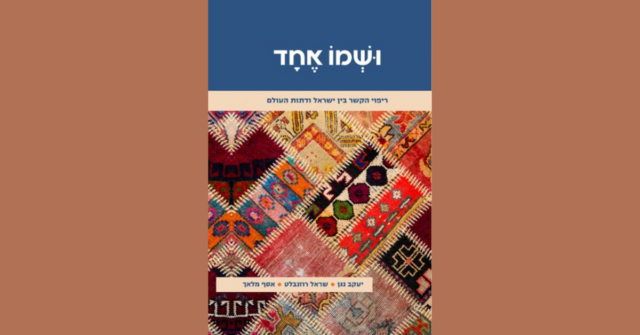Nov 8, 2022 By: yunews

Yakov Nagen, Sarel Rosenblatt and Assaf Malach | Maggid Books | 2022
Reviewed by Rabbi Dr. Stu Halpern
And His Name Is One: Healing Judaism's Relations With World Religions [Hebrew], edited by Yakov Nagen, Sarel Rosenblatt and Assaf Malach, is a pathbreaking book. A product of Ohr Torah Stone's Blickle Institute for Interfaith Dialogue and the Beit Midrash for Judaism and Humanity, the volume surveys major rabbinic thinkers' perspectives on Judaism's relationships with other religions. Building off of Alan Brill's earlier English-language volume, Judaism and Other Religions: Models of Understanding, this volume offers an Israel-centric perspective. As the editors argue, while earlier 20th-century traditional thinkers like Rabbi Joseph Soloveitchik forbid interfaith dialogue (as argued in his seminal essay, Confrontation), contemporary Israel offers an unprecedented and welcome opportunity to teach Torah to other nations and other faiths. "Who knows," wonders Rosenblatt in the book's conclusion, alluding to the book of Esther, "if not for this moment did we [the State of Israel] assume [political] authority." In support of their thesis, the editors, along with additional contributors, offer brief surveys of relevant thinkers on the topic. Chapters cover more well-known figures like Maimonides, Judah HaLevi and the Meiri, as well as lesser-known figures like the contemporary of Maimonides, Rabbi Netanel al-Fayyumi and the 19th-century figure Rabbi Eliyahu ben Amuzag. Particularly fascinating highlights are an analysis of Rabbi Yaakov Emden's sympathetically inclined writings on Christianity and a chapter on Rabbi Jonathan Sacks' writings on interfaith relations, including his argument that one is to "hear the voice of God speaking through the language of another." In utilizing traditional sources to argue (often against other traditional sources) for Jewish interactions with other faiths emerging from a sense of shared humanity and even brotherhood, certain themes appear often. Many of the thinkers profiled reference the concept of the Seven Noahide commandments as providing a framework for the relationship with non-Jewish religions, while others, most prominently the Meiri, offer a shared sense of morality as justification. Many thinkers wrestle with the possibility that non-Jewish figures could, or did, receive some form of revelation, albeit one lower than the Jewish prophets'. Also considered is the role that other nations are to play, and how they are to worship, once the Messiah arrives. Moving from intellectual history to practical application, the authors end their volume with learned examinations of the relevant halakhic issues pertaining to teaching Torah to non-Jews, the role of non-Jews in the Temple and the relationship between non-Jews and the Sabbath. Whether or not all readers will ultimately conclude with the editors' inclinations and readings (significant primary source citations are included in most chapters), And His Name Is One is undoubtedly written in a spirit of yirat Shamayim [fear of Heaven] and by individuals of deep learning, seeking to inspire those both within and beyond the Jewish community through our tradition's eternal teachings. To read more Straus Center book reviews, click here. You can learn more about the Straus Center and sign up for our newsletter here. Be sure to also like us on Facebook, follow us on Twitter and Instagram and connect with us on LinkedIn.
